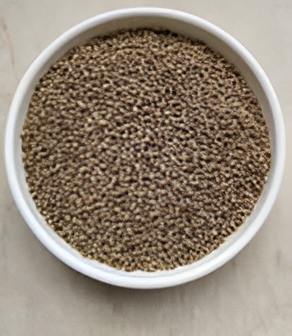
Ajwain: The Versatile Spice with Health Benefits
Ajwain, also known as carom seeds or bishop’s weed, is a popular spice in Indian cuisine, revered not just for its unique flavor but also for its numerous health benefits. With its strong aroma and slightly bitter taste, ajwain is commonly used in a variety of dishes, from breads to curries, and is a staple in many Indian households. This article delves into the various aspects of ajwain, exploring its culinary uses, health benefits, and other interesting facts.
Culinary Uses of Ajwain
Ajwain seeds are small, oval-shaped, and typically light brown in color. They have a distinct flavor that is often compared to thyme but with a more potent and pungent aroma. Here are some of the primary culinary uses of ajwain:
- Flavoring Agent: Ajwain is widely used in Indian cooking to enhance the flavor of various dishes. It is often added to lentil soups (dal), vegetable curries, and spice blends, giving them a unique taste.
- Breads and Snacks: Ajwain is commonly included in the preparation of Indian breads such as parathas and puris. The seeds are also a key ingredient in many snacks, providing a delicious crunch and flavor.
- Pickles and Chutneys: Ajwain is frequently used in pickles and chutneys for its ability to balance the spices and add depth to the flavors.
- Medicinal Teas: Ajwain tea, made by steeping ajwain seeds in hot water, is a traditional remedy for various ailments, especially digestive issues.
- Seasoning for Oil: In many Indian households, ajwain is tempered in hot oil before being added to dishes. This method releases its essential oils and enhances its flavor.
Health Benefits of Ajwain
Ajwain is not only a flavorful spice but also comes packed with numerous health benefits. Here are some of the key advantages of incorporating ajwain into your diet:
- Digestive Health: One of the most well-known benefits of ajwain is its positive effect on digestion. It is often used to alleviate bloating, gas, and indigestion. The presence of thymol, a compound in ajwain, stimulates the production of gastric juices, aiding digestion.
- Antimicrobial Properties: Ajwain has been shown to possess antimicrobial and antifungal properties. This makes it effective against various infections and can help improve overall immune function.
- Respiratory Relief: Ajwain is often used in traditional remedies for respiratory ailments. Its anti-inflammatory properties can help relieve symptoms of asthma, bronchitis, and colds by acting as a natural expectorant.
- Pain Relief: The spice is known for its analgesic properties, which can help relieve headaches, joint pain, and muscle aches. A paste made from ajwain seeds can be applied topically for localized pain relief.
- Weight Management: Ajwain may aid in weight management by boosting metabolism. Including it in your diet can help curb appetite and promote fat loss, making it a valuable addition to weight loss diets.
- Blood Sugar Regulation: Some studies suggest that ajwain may help in regulating blood sugar levels. This makes it a beneficial spice for individuals with diabetes or those looking to maintain healthy blood sugar levels.
How to Use Ajwain in Your Cooking
Incorporating ajwain into your cooking is simple and can elevate the flavor of many dishes. Here are some tips on how to use ajwain effectively:
- Use in Moderation: Due to its strong flavor, ajwain should be used sparingly. A little goes a long way, so start with a small amount and adjust according to your taste preference.
- Toast for Enhanced Flavor: Toasting ajwain seeds before adding them to dishes can enhance their flavor. Simply heat them in a dry pan until they become fragrant, then use them in your recipes.
- Combine with Other Spices: Ajwain pairs well with a variety of spices, including cumin, coriander, and turmeric. Combining these spices can create complex flavors in your dishes.
- Infuse in Oil: For a more intense flavor, infuse ajwain seeds in oil. This can be used as a dressing for salads or as a cooking medium for various dishes.
- Make Ajwain Water: For digestive health, consider making ajwain water by soaking a teaspoon of ajwain seeds in water overnight and drinking it on an empty stomach in the morning.
Precautions and Considerations
While ajwain is generally safe for consumption, some individuals may experience allergic reactions or digestive discomfort. It is essential to consume it in moderation and consult a healthcare professional if you have any concerns, especially if you are pregnant or nursing.
Conclusion
Ajwain is a versatile spice that not only adds a distinct flavor to your dishes but also comes with a myriad of health benefits. From improving digestion to providing antimicrobial properties, ajwain is a valuable addition to any kitchen. Whether you are using it in cooking, making medicinal teas, or exploring its health benefits, ajwain can be a powerful ally in your culinary and wellness journey. Embrace this remarkable spice, and discover the myriad ways it can enhance your meals and promote good health.